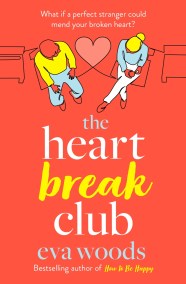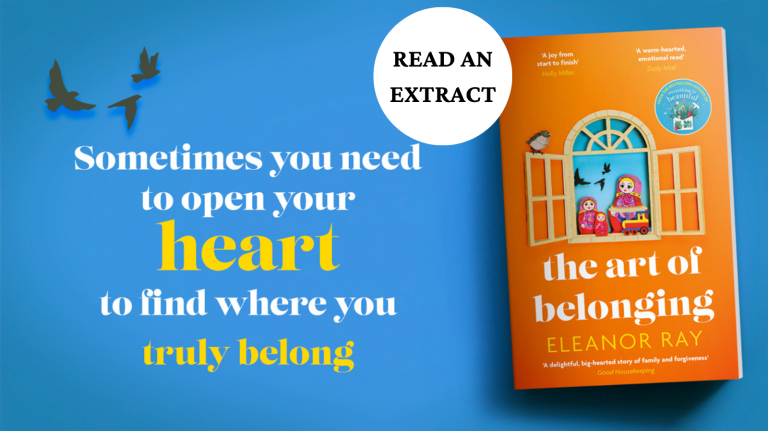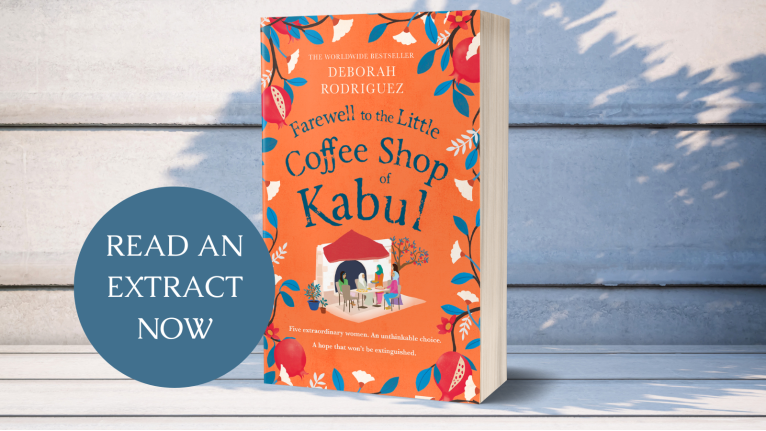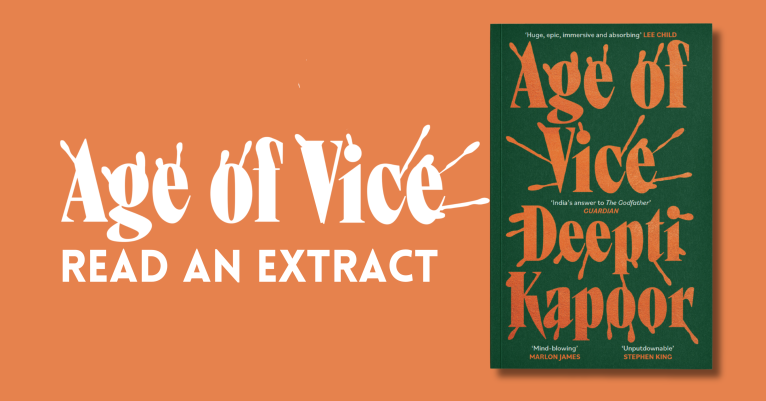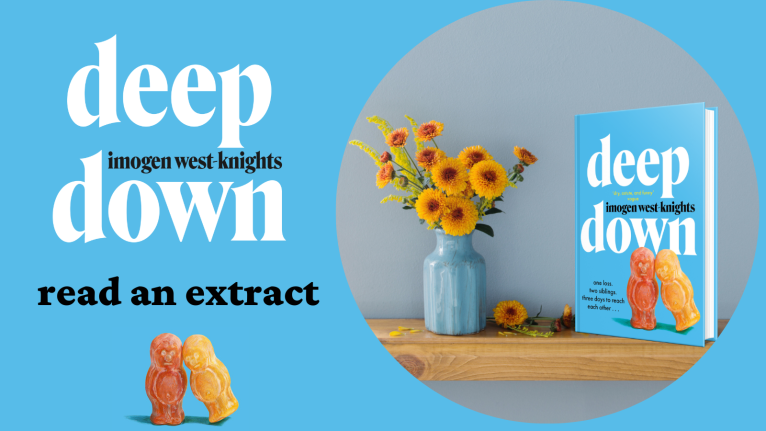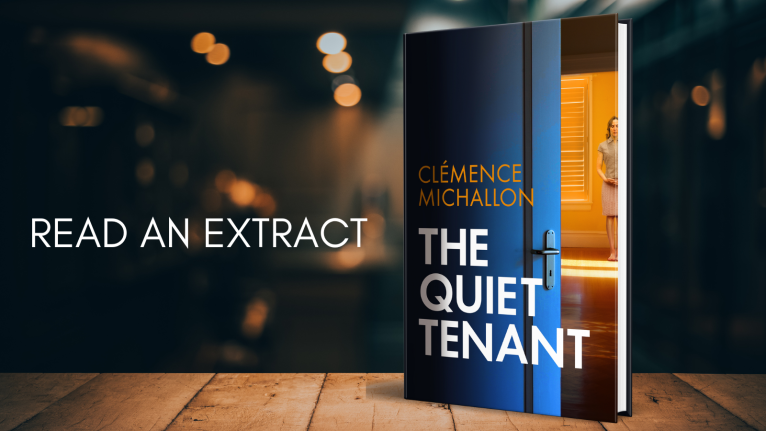Read an extract from The Heartbreak Club by Eva Woods

PROLOGUE
To begin with, there were two people, and their names were Niamh and Antony. They didn’t know each other, and they never would. But the same life-defining moment came for both of them in turn, within the same short space of time.
For Niamh it was a choice, a half-second’s distracted decision to step off the pavement without looking right then left then right again, as she’d been taught in the Tufty Club at primary school. She didn’t see the car, a red Vauxhall Astra, driven, it was later determined, two miles under the speed limit. The moment for her was very brief – a flash of red, a snippet of radio playing ‘Livin’ La Vida Loca’, of all the songs in the world, a feeling of being lifted up and falling. For a second the world stretched, the blue sky above, the flap of pigeon wings, the blare of a car horn. That was it.
For Antony – Anto – it was a note, written on lined paper torn from the school exercise book of a child he’d never met and didn’t know the name of (Davey Magee, aged seven). It was a rainy day, dripping onto leaves and umbrellas and the windows of the redbrick house. It was the thought he’d carried all morning, a sick, almost- excited terror – if she offers to go to the shops, I will. If not, then no. It was writing a name, as neatly as he could, knowing now was the time to be clearly understood, scratching the pen on the paper to make it run. Caroline . . .
For everyone, the moment that comes is this – you understand you are going to die. Not just know it – really, we all secretly think it won’t happen to us – but understand it, finally. You are going to die.
Caroline
People say mad things to you when your husband has died.
‘Ah, sure you’re young, there’s time for you,’ was a classic of the genre, currently being trotted out by some friend of Anto’s mother, a woman in a grey trouser- suit ensemble who was shoving a devilled egg into her face. Caroline wanted to scream – I’m thirty- six! I don’t have that much time, you stupid bint! Even if she had a child right now she’d be considered an elderly mother, and the unfortunate death of her husband had put those plans somewhat on the back burner.
Others chose, ‘He’s with God now.’ Was he, since he was an atheist and had once called the Pope a human- rights abuser? Or, ‘He’s looking down on us.’ Was he, or was he just dead, snuffed out? Likely he had no awareness at all that she was here in his mammy’s living room, having struggled through a memorial service for him, followed by tea, drinks and finger food. He wasn’t looking down on her, or wanting her to go on with her life or eat a devilled egg or have a gin and tonic, as his drunken uncle Martin kept insisting, though it was 2.30 p.m. on a Monday. He hadn’t been taken too soon or given up his fight or any such bullshit. He had chosen to go, and leave her here, stuck with his extended family and neighbours and assorted rubberneckers, and she was just so angry with him she wanted to scream.
Caroline was so deeply, raging mad. Mad at Anto. Mad at these people with their stupid comments, mad that she’d had to take the day off work, because Anto’s mother had insisted on holding his memorial service on a Monday for some reason to do with the church being double- booked for a Zumba class. She and Anto would have laughed about that, except for him being dead.
She was also mad that today made it seventy- six calendar days since Anto had been lowered into the ground, in the graveyard nearest their home in Belfast (an issue which Caroline was vaguely aware had caused some ructions within his family, who’d wanted him brought back here to their plot).
Almost three months. She barely remembered the funeral, since in Ireland you had to have them within two days or the world would apparently come to an end, and two days after it happened she had still been struggling to breathe, and put one foot in front of the other, adjust to a world that was fundamentally different than it had been, because Anto was no longer in it. Let alone pull together a funeral for two hundred people and field endless questions like would Anto have wanted flowers?
Do you not agree Anto would have wanted live music in church, instead of taped like our Patrick seems to think is acceptable? Would Anto have wanted money behind the bar? A sit- down meal? How the bloody hell would she know? They’d never discussed their ‘wishes’, seeing as they were in their thirties. And apparently, she’d known nothing about what Anto wanted anyway. At the very least she had assumed he wanted to be here, with her, but it turned out that was not the case.
‘Look at the time,’ Caroline mumbled, as Anto’s sister Julie elbowed her way across the room towards her, no doubt to discuss whether Anto might have left her annoying kids any money in his will. He didn’t even have a will because, of course, he was thirty- eight years old. ‘I better shoot.’
‘Already?’ Anto’s mother Mary, the matriarch of the family, looked pointedly at the carriage clock over the mantelpiece.
‘You’ve hardly got here, Caroline.’ Never mind the fact that she’d driven all the way down there, missing out on a full day’s teaching, so would be playing catch- up all week trying to undo the lax habits of the substitute, who last time had let the kids watch a DVD of Frozen instead of learning long division, and Caroline had been paying for it ever since.
‘I know, I know, but I have my support group tonight. I need to go every time, sure you know how it is.’ Being a sensible sort of person, Caroline had of course got all the help she could find for her situation; grief counsellors, grief support groups, self- help books, even a mad woman called Rosa who ‘smudged’ the house with sage, making the whole place smell of roast dinners. As she downed her tea, she reflected that the group was also useful as a means to escape from unwanted social situations. So far, it had moved around to be basically every night of the week, depending on what event she wanted to get out of. It actually was on a Monday night, however, so she could say goodbye to Mary without a flicker of guilt, and get back on the Westlink before rush hour kicked in.
Mary hesitated, moving in closer so that Caroline could smell her magnolia hand cream. ‘Love. Can we have a wee coffee or something this week? After your work tomorrow, maybe?’
She and Mary did not have coffee together. And why so soon after today? Caroline blinked. ‘Well, sure we can. How come?’
Mary was lowering her voice, a rare event in itself. ‘We just . . . have a few things to talk about, that’s all. About what happens now.’ The headstone, Anto’s assets, that kind of thing, Caroline imagined. Her heart sank further. It was cruel enough losing someone, let alone doing the extra work that all the death admin involved. Deathmin. She hated it.
As she got into her car, she finally let herself think about Anto’s grave as she had seen it on her last visit. The fresh wound of the broken earth was healing over already, grass and weeds growing on top of it (Mary had lobbied hard for some ‘nice gravel’, but Caroline knew he would have wanted something natural. Or thought she knew, anyway. Maybe she hadn’t known anything about him at all.) The earth had taken Anto back, time was moving on, and he was still gone. Somehow, that was even worse than when it first happened.
Josh
It was hard to choose the worst thing about your wife being dead. There’d been some bad moments, for sure – identifying her body in the morgue, for one. The image was burned into him. A face the colour of candle wax, her curly fair hair not quite covering the red mark on her forehead. It was Niamh’s face and yet not, the life gone out of it. Then there was breaking the news to her mum and dad, who were in their seventies, and took a long time to get to the phone, because it was him the police had called when it happened. He didn’t know what was worse – being the first to know, before anyone else did, or being the last, going on living your life for another few hours thinking everything was fine, when it never would be again.
Then there was planning her funeral with bewildering speed, which they insisted on doing in Ireland for some reason, no one sleeping at all for three days, her brother and three sisters arguing over music and food and flowers, his own mum barely able to make it from London in time.
But this – two months after his wife’s funeral – was also a bad moment. He had to clear away her things and throw them out, because she wasn’t coming back for them, because she was dead. People had offered to do it, of course. Some strange instinct seemed to kick in in Ireland when a tragedy took place, women cosseting men as if they could do nothing for themselves.
He had turned down the help of Niamh’s oldest sister Siobhan, who was already a grandma, and her middle one Darragh, and nearest-in-age one Clare, and various aunties and her friends from school and work. ‘Mammy’ was considered too fragile to do such things, after a brush with breast cancer two years before.
Niamh’s father, a farmer of seventy- three, had so far said nothing to Josh about her death, except to clap his shoulder and mutter, ‘Ah son.’ Even the son was something, and he’d imagined telling Niamh about it, dissecting this new development for signs that her dad’s discomfort with a fella who was not only English but black too had eased, but he couldn’t do that of course, because she was dead. Maybe that was the worst bit, in fact. Not being able to tell her anything that was going on and hear her laugh against his neck and say, ‘Ah Jesus, I dragged you back to the eighteenth century, so I did.’
He sat back on his heels in what had been their bedroom, having barely made a dent in Niamh’s wardrobe, stuffed full of dresses, jeans, scarves, hats, you name it. The woman had never thrown anything away – she still had her First Communion outfit in there. The clock on the bedside table said it was almost six, so that meant he needed to stop and get ready for support group, which was some relief, as he could put the task of clearing out her things off for another day. Caroline would never forgive him if he was late to the group.
Anyway, he reflected, getting up and wincing at the pain in his knees, it wasn’t as if her clothes were going anywhere. That was the problem.
The support group was held in a shabby community centre not far from the Falls Road. Inside, the corridor was lit up with fluorescent bulbs. There were several events and classes going on at the same time – the local am dram group rehearsing Hairspray, the historical society looking at slides of an old workhouse, an AA meeting. Josh still remembered how nervous he’d been on his first night, angry that he even had to be in a place where people were singing songs from a musical (really badly) and there was an honesty box to chip in for loo roll, how ridiculous he felt even trying something so stupid as a support group in the face of his overwhelming loss. He’d been standing in the car park having an argument with himself when a woman walked briskly past in a yellow raincoat, and as she opened the shatterproof door of the community centre, a snatch of song had come out, something about Baltimore. ‘Are you coming in?’ she’d said to him.
No. It’s stupid. ‘Um . . . ’
She seemed to understand. ‘I was the same my first time. Grief support, is it?’
Was it that obvious? ‘Um . . . yeah.’
She held the door. ‘Come on. I’ll walk you in.’
He’d wanted to bolt. Instead, he had mumbled a reply and shuffled forward, into the strip lighting of the centre’s corridor, the posters for tae kwan do and Irish dancing and yoga flapping in his wake. And here she was again, several months on, that same woman, walking into the wet car park, in the same yellow coat, with the same air of purpose, and he realised he had been hovering there to wait for her, so they could go in together again.
Caroline smiled at him as she approached, face bright under her hood. ‘All right?’
‘Ha. No.’
‘Me either. Once more into the breach though, anyway?’
‘Suppose so. Bloody breach, I hate it.’
‘I know. But sure what else can we do?’
They went in.
The first rule of heartbreak club is - get your heart broken. That's all really.
Caroline's heart broke when her husband took his own life.
Josh's heart broke when his wife was killed in an accident.
And somehow, talking to a group of strangers once a week doesn't seem to be helping either of them.
Until Sylvia arrives.
When she lost her own partner two years ago, she fell apart and had to put herself back together. Most of all she wished for the help of someone who'd been through it already. And now she's here to pass her handbook on to those who need it most.
The problem is, following Sylvia's rules means looking to the future. And Caroline and Josh each need some answers from their past before they can even think about that...

